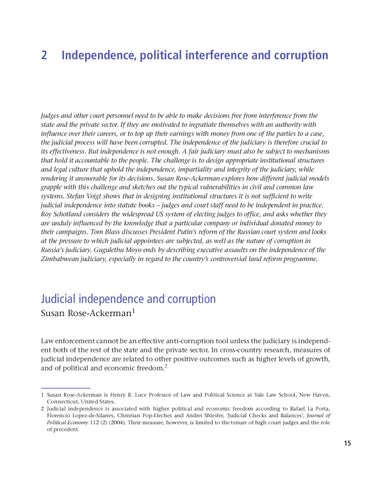2
Independence, political interference and corruption
Judges and other court personnel need to be able to make decisions free from interference from the state and the private sector. If they are motivated to ingratiate themselves with an authority with influence over their careers, or to top up their earnings with money from one of the parties to a case, the judicial process will have been corrupted. The independence of the judiciary is therefore crucial to its effectiveness. But independence is not enough. A fair judiciary must also be subject to mechanisms that hold it accountable to the people. The challenge is to design appropriate institutional structures and legal culture that uphold the independence, impartiality and integrity of the judiciary, while rendering it answerable for its decisions. Susan Rose-Ackerman explores how different judicial models grapple with this challenge and sketches out the typical vulnerabilities in civil and common law systems. Stefan Voigt shows that in designing institutional structures it is not sufficient to write judicial independence into statute books – judges and court staff need to be independent in practice. Roy Schotland considers the widespread US system of electing judges to office, and asks whether they are unduly influenced by the knowledge that a particular company or individual donated money to their campaigns. Tom Blass discusses President Putin’s reform of the Russian court system and looks at the pressure to which judicial appointees are subjected, as well as the nature of corruption in Russia’s judiciary. Gugulethu Moyo ends by describing executive assaults on the independence of the Zimbabwean judiciary, especially in regard to the country’s controversial land reform programme.
Judicial independence and corruption Susan Rose-Ackerman1 Law enforcement cannot be an effective anti-corruption tool unless the judiciary is independent both of the rest of the state and the private sector. In cross-country research, measures of judicial independence are related to other positive outcomes such as higher levels of growth, and of political and economic freedom.2
1 Susan Rose-Ackerman is Henry R. Luce Professor of Law and Political Science at Yale Law School, New Haven, Connecticut, United States. 2 Judicial independence is associated with higher political and economic freedom according to Rafael La Porta, Florencio Lopez-de-Silanes, Christian Pop-Eleches and Andrei Shleifer, ‘Judicial Checks and Balances’, Journal of Political Economy 112 (2) (2004). Their measure, however, is limited to the tenure of high court judges and the role of precedent.
15
